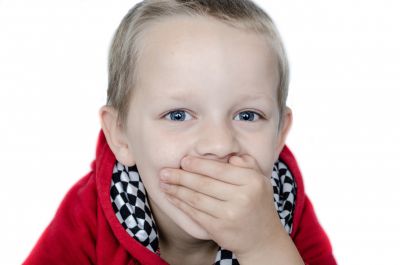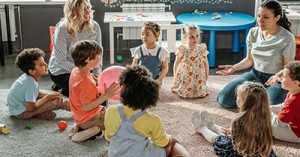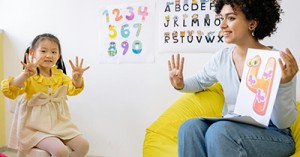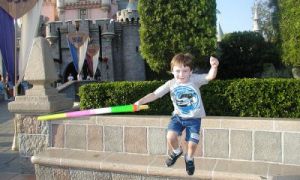Preschoolers enjoy talking and are happy to tell their ideas or what they're thinking. They combine words with gestures and facial expressions to make their stories more believable and interesting. Words begin to flow easily and with little effort. During this age, preschoolers will have an endless amount of questions and seeks more detailed information about events or topics that interest them.
Language Development Milestones
- understands the concepts (same and different)
- speaks in sentences of 6 or more words
- asks lots of questions
- speaks clearly enough for others to understand
- often ask the when, how and why questions
- begins to use comparatives correctly (fast, faster, fastest)
- able to Re-tell a story
- repeats words with more syllables
- enjoys engaging in pretend play
- understand between two and three instructions
- names familiar objects and animals
- pays attention while listening to a story
- correctly names and identifies shapes and colours
- uses because and so correctly
- speaks in sentences and use many different words
- answers simple questions
- tells stories
- talks constantly
- enjoys talking and may like to experiment with new words
- uses adult forms of speech
- takes part in conversations
- enjoys jokes, rhymes and stories
- will assert self with words
- pronunciation of words are clear
- uses many descriptive words while talking
- enjoys telling stories
- able to say own age
- has a basic understanding of time (morning, afternoon, night)
- begins to use more polite words while talking
- uses language to tease and tell jokes
- understands sequence of events
- overall speech should be grammatically correct
- uses future tense
- tells longer stories
- says name and address
A preschooler's speech and language becomes more complex from this age because of their broader vocabulary and a greater understanding of grammatical concepts while speaking. By the end of this stage preschoolers are able to express their ideas and feelings in detail. A preschooler enjoys talking and at times will never want to stop...







 Toddlers have a greater understanding of the world around them by this stage. Their cognitive development (also known as intellectual development and thinking skills) continues
Toddlers have a greater understanding of the world around them by this stage. Their cognitive development (also known as intellectual development and thinking skills) continues Infants begin to develop trust when parents begin to fulfil their needs. Such as changing an infant's nappy when needed, feeding on request and holding
Infants begin to develop trust when parents begin to fulfil their needs. Such as changing an infant's nappy when needed, feeding on request and holding Beginning at birth the construction of thought processes, such as memory, problem solving, exploration of objects etc, is an important part of an infant’s cognitive
Beginning at birth the construction of thought processes, such as memory, problem solving, exploration of objects etc, is an important part of an infant’s cognitive Toddlers want to do more on their own and do not like it when you begin to establish limits on their behaviour. Tantrums can become
Toddlers want to do more on their own and do not like it when you begin to establish limits on their behaviour. Tantrums can become Your preschooler is now able to focus their attention more accurately and is less influenced by distractions. The intensity of questions increase as your child
Your preschooler is now able to focus their attention more accurately and is less influenced by distractions. The intensity of questions increase as your child John Dewey is often seen as the proponent of learning by doing – rather than learning by passively receiving. He believed that each child was active,
John Dewey is often seen as the proponent of learning by doing – rather than learning by passively receiving. He believed that each child was active, Toddler advance and gains new skills in Gross Motor Development milestones achieved throughout earlier years. Co-ordination and challenges that could not be performed before such
Toddler advance and gains new skills in Gross Motor Development milestones achieved throughout earlier years. Co-ordination and challenges that could not be performed before such Erik Erikson developed a psychosocial theory to understand how we each develop our identities through eight stages of psychosocial development from infancy to adulthood. The
Erik Erikson developed a psychosocial theory to understand how we each develop our identities through eight stages of psychosocial development from infancy to adulthood. The At this point preschoolers begin to interact effectively with others. Play becomes more innovative and organized and “boyfriend” or “girlfriend” begins to emerge. Preschoolers have
At this point preschoolers begin to interact effectively with others. Play becomes more innovative and organized and “boyfriend” or “girlfriend” begins to emerge. Preschoolers have From now, babies begin to identify and respond to their own feelings, understanding other's feelings & needs and interact positively with others. A baby's social and
From now, babies begin to identify and respond to their own feelings, understanding other's feelings & needs and interact positively with others. A baby's social and


